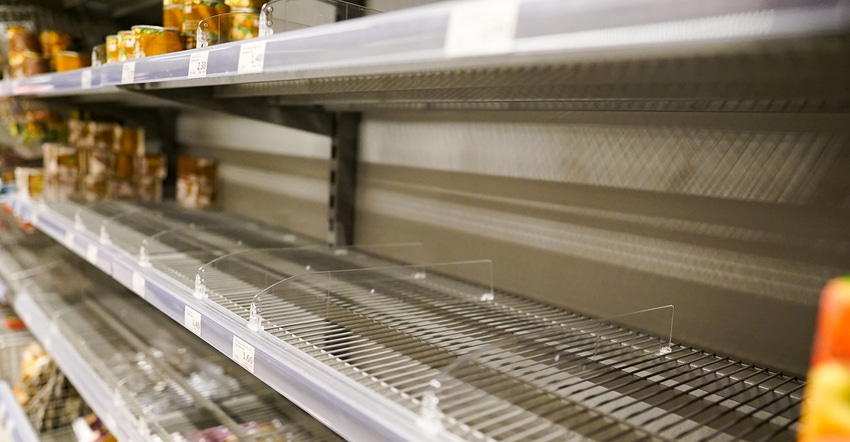Food and beverage trade associations, organizations work to mitigate COVID-19 impact
The COVID-19 pandemic continues to wreak havoc on the global food and beverage industry, from farm to table.

The COVID-19 pandemic continues to wreak havoc on the global food and beverage industry, from farm to table. Growers, importers, manufacturers and restaurants are all struggling with the effects the virus is having on the global and national economy at large, including closing of facilities, mandated social distancing efforts and a consumer base that is increasingly staying home for the greater good.
In these times of such unprecedented disruption and rapid change, the food and beverage industry will rely on not only governing bodies such as FDA, USDA and the CDC, but also the trade associations and non-governmental organizations (NGOs) that lead them.
The Consumer Brands Association (CBA), formerly the Grocery Manufacturers Association, is taking proactive measures to not only respond to the current situation, but to lead efforts to combat it. Geoff Freeman, president and CEO of the CBA, wrote a letter to President Donald Trump on March 15 following a conference call between the two.
That letter stated, in part, “The Consumer Brands Association has coordinated industry efforts and is developing recommendations to alleviate potential supply chain disruptions in the short-, mid- and long-term.” The letter went on to list a set of “immediate recommendations where the industry would appreciate your administration’s leadership, so we may better meet the needs of American families.” Those recommendations included a request for funds, via emergency supplemental appropriations bills currently in the works, to “mitigate supply chain disruptions and manage food, personal care, hygiene, cleaning, disinfecting and sterilization input shortages.” Additional recommendations included greater coordination with state governments, the establishment of an Office of Supply Chain to better coordinate across agencies, and a temporary suspension of any new regulatory decisions that “could hinder supply chains or take focus and resources away from the national need for increased production and delivery of critical goods."
The United Fresh Produce Association is also taking steps to keep members abreast of the current situation. In an open letter dated March 19, president and CEO Tom Stenzel noted the achievement of what he described as an “immediate priority;” the Department of Homeland Security’s (DHS) official announcement that workers throughout the supply chain would be deemed essential to critical infrastructure.
“We have been fighting multiple state and local shelter-in-place rules that have disrupted workers and operations,” Stenzel wrote. “With this statement we should be able to drive greater national consistency.”
The letter went on to note a push for CDC, FDA and DHS officials for stronger government guidance for food supply organizations in the event workers test positive for the virus. The letter ended with a sober reminder of the seriousness of the current situation facing the industry, stating:
“While many sectors of our industry have been set back by this crisis, the foodservice sector and foodservice distributors in particular have been devastated by the shutdown of the restaurant and hospitality industry. United Fresh teamed with the International Foodservice Distributors Association (IFDA) to urge the President and Congress to recognize the devastation to the foodservice distribution sector and elevate immediate financial relief for the sector. We’ve gathered financial impact from our produce distributors across the country and continue to use that data to drive home the impact with Congressional leaders working on financial support.
The National Restaurant Association knows all too well the toll social distancing, mandated closures and supply chain disruption are taking on their industry. The organization’s homepage prominently features an online petition to Congress, citing a forecasted loss of $225 billion and more than 5 million jobs over the next three months, asking for direct and indirect relief. This includes direct relief from a new restaurant recovery fund; community grants for disaster relief assistance; guaranteed loans and business interruption insurance; lost revenue coverage from the government and more.
Some industries, though, are mitigating the impacts of COVID-19 quite well. The American Spice Trade Association (ASTA), like so many others, has put COVID-19 resources on its website, including direction from CDC and the World Health Organization. ASTA notes, in part, “At present time, the spice industry is not experiencing any broad supply chain challenges related to the coronavirus. However, each company’s supply chains are unique, and companies must work individually with their suppliers to assess their particular situation. As this situation is rapidly developing, ongoing supply chain monitoring and contingency planning is recommended.”
In a recent conversation with Richard Waycott, president & CEO, Almond Board of California, he stated the almond industry has yet to see major disruptions—though he was quick to point out that forecasting the future at this point is difficult to the point of impossibility. While exports to China are down, Waycott attributed a large part of that downturn to tariffs rather than export issues related to the pandemic and noted exports for the month of March are expected to be up from last year; the same was true in February.
Waycott did note, however, that other similar industries currently in harvest season (almond harvesting season is August through October) could face much more difficulties.
“Some of the other grow industries could face more difficulties as workers either can’t or won’t show up. Visa issues and travel restrictions could harm seasonal workers and their crops,” he noted. Waycott also emphasized the importance of constant vigilance, as new information is coming round-the-clock.
About the Author(s)
You May Also Like






